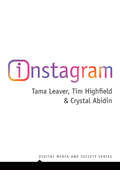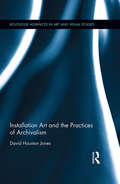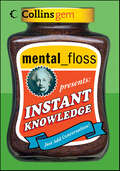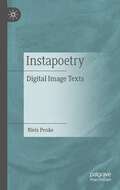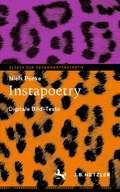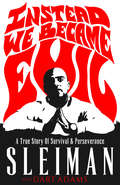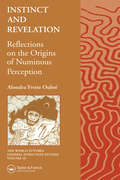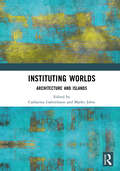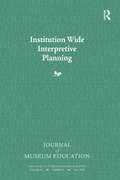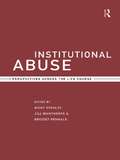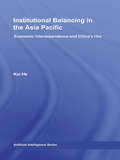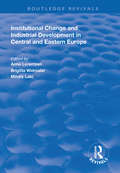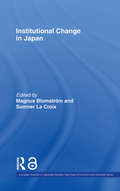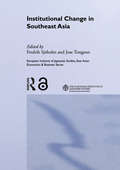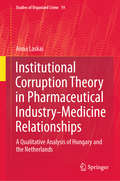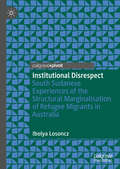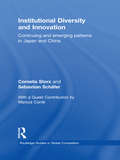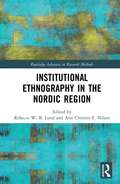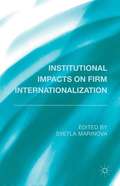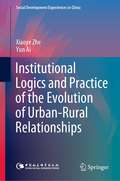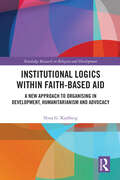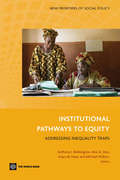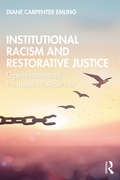- Table View
- List View
Instagram: Visual Social Media Cultures (Digital Media and Society)
by Crystal Abidin Tama Leaver Tim HighfieldInstagram is at the heart of global digital culture, having made selfies, filters and square frames an inescapable part of everyday life since it was launched in 2010.In the first book-length examination of Instagram, Tama Leaver, Tim Highfield and Crystal Abidin trace how this quintessential mobile photography app has developed as a platform and a culture. They consider aspects such as the new visual social media aesthetics, the rise of Influencers and new visual economies, and the complex politics of the platform as well as examining how Instagram's users change their use of the platform over time and respond to evolving features. The book highlights the different ways Instagram is used by subcultural groups around the world, and how museums, restaurants and public spaces are striving to be 'Insta-worthy'. Far from just capturing milestones and moments, the authors argue that Instagram has altered the ways people communicate and share, while also creating new approaches to marketing, advertising, politics and the design of spaces and venues.Rich with grounded examples from across the world, from birth pictures to selfies at funerals, Instagram is essential reading for students and scholars of media and communication.
Installation Art and the Practices of Archivalism (Routledge Advances in Art and Visual Studies)
by David Houston JonesOn the leading edge of trauma and archival studies, this timely book engages with the recent growth in visual projects that respond to the archive, focusing in particular on installation art. It traces a line of argument from practitioners who explicitly depict the archive (Samuel Beckett, Christian Boltanski, Art & Language, Walid Raad) to those whose materials and practices are archival (Mirosław Bałka, Jean-Luc Godard, Silvia Kolbowski, Boltanski, Atom Egoyan). Jones considers in particular the widespread nostalgia for ‘archival’ media such as analogue photographs and film. He analyses the innovative strategies by which such artefacts are incorporated, examining five distinct types of archival practice: the intermedial, testimonial, personal, relational and monumentalist.
Instant Knowledge (Collins Gem)
by Editors of Mental FlossMental_floss is proud to present a full-bodied jolt of inspiration for thirsty minds on the go. Blended with titillating facts, startling revelations, and head-scratching theories collected from around the world, Instant Knowledge will jumpstart riveting exchanges at cocktail parties, the watercooler, or any powwow. To experience the clean, rich flavor at home, just tear into a topic of your choice, and add conversation. It's that simple!
Instapoetry: Digital Image Texts
by Niels PenkeInstapoetry is one of the most popular literary phenomena of our time. In just a few years, millions of short to ultra-short texts have been published and shared on Instagram. In the battle for attention with countless other texts, the mechanisms of the platform and the usage routines of the users have to be served. The external pressure on literary production is immense. The book explains the production strategies and reception procedures of Instapoetry, explains its development and locates its significance - somewhere between the last stage of decay and the future of poetry.
Instapoetry: Digitale Bild-Texte (Essays zur Gegenwartsästhetik)
by Niels PenkeInstapoetry zählt zu den populärsten literarischen Phänomenen der Gegenwart. In wenigen Jahren sind Millionen von kurzen bis ultra-kurzen Texten auf Instagram publiziert und geteilt worden. Im Kampf um Aufmerksamkeit mit unzähligen anderen Texten müssen die Mechanismen der Plattform und die Nutzungsroutinen der User bedient werden. Der äußere Druck auf die literarische Produktion ist immens. Das Buch erklärt die Produktionsstrategien und Rezeptionsverfahren von Instapoetry, erläutert ihre Entwicklung und verortet ihre Bedeutung – irgendwo zwischen letzter Verfallsstufe und Zukunft der Lyrik.
Instauration der Erde: Konstitutives Erzählen im Anthropozän und die kritischen Zonen der Literatur (Environmental Humanities #2)
by Simon ProbstMit dem Anthropozän wird oft das Entstehen einer planetaren Universalität und die ‚Wiederkehr der großen Erzählungen‘ verknüpft. Die Verflechtungen von Menschen und Erde werden hier zur Grundlage kultureller Selbstverständigung. Das Buch untersucht strukturelle Merkmale und Problemkonstellationen dieser erdgebundenen konstitutiven Erzählungen. Wie können sie globale Ungleichheiten berücksichtigen? Wie lassen sie die Erde und andere Spezies zu Wort kommen? Inwiefern sind diese Erzählungen selbst planetare Kräfte? Und: Wie kann das Eigenwissen der Literatur unseren Blick auf die Erde erweitern? Diese Fragen werden im Dialog von Wissenschaft und Literatur untersucht. Eingehende Lektüren verbinden kanonische Texten des Anthropozän-Diskurses (z.B. Dipesh Chakrabarty, Donna Haraway, Bruno Latour und Isabelle Stengers) mit literarischen Stimmen (Ursula K. Le Guin, Daniel Falb, Christoph Ransmayr).
Instead We Became Evil: A True Story Of Survival & Perseverance
by Sleiman Dart AdamsA powerful story of struggle, survival, and hope for the future is told by one of Denmark's most successful artists. The violent, compelling debut, co-written with journalist Dart Adams, provides a complex portrait of one man and the various ways in which every social system that was supposed to help him failed him, while also delving into the psychology of immigrant gangs and the young men who fall into them. But ultimately, it's a narrative about tenacity, survival, and optimism for the future. Sleiman was born in Lebanon during the 1982 bombardment and is a Palestinian. His family eventually moved to Denmark, but their new life there was far from perfect. Sleiman was subjected to domestic violence as well as social rejection as a Muslim immigrant. Angry and powerless, he found himself drawn to gang life.Sleiman had dropped out of school and was one of his gang's most feared and revered members as a teenager. He was involved in hundreds of crimes during his peak, but after surviving an attempted assassination, he addressed his demons and permanently abandoned the gang life. Sleiman is now narrating his story in his own words in the hopes of discouraging others from following in his footsteps.
Instinct and Revelation: Reflections on the Origins of Numinous Perception (The\world Futures General Evolution Studies #Vol. 10)
by Alondra OubreInstinct and Revelation revolves around the hypothesis that ritual behavior and imaginative awareness in early hominids may have helped to spawn the evolution of the human brain and human consciousness. Using an integral perspective comparable with systems theory, the book carefully interweaves fact and theory from physical and cultural anthropology, psychobiology and the brain sciences, psychology, and to a lesser degree, eastern philosophy. This book breaks from tradition by discussing from a primarily anthropological perspective the origin of human consciousness within a philosophical framework that embraces precepts from human evolution, evolutionary psychology, the neurosciences, biocultural anthropology, and cultural symbolic anthropology.
Instituting Worlds: Architecture and Islands
by Catharina Gabrielsson Marko JobstIslands have a long history of appealing to the architectural imagination and have served as sites for architectural expressions of cultural specificity, cultural conquest, and cultural hybridisation over millennia. From offshore financial centres to immigrant detention camps, tourist havens to military bases, the architectures of islands concretise the forces at play in our contemporary, crisis-ridden societies.Collecting writings by a wide range of established scholars together with exciting new voices in architecture and affiliated disciplines, this book shows the pertinence islands hold for critical spatial thinking and practice today. Covering war and colonialism, detention and tourism, the topics raised in this book range from issues of urban development to close readings of buildings – whether ruined, designed, projected, preserved, or absent. Combing case studies, critical historiography, and pieces of experimental writing, the chapters disclose the variety of ways in which architecture can be used as a lens for analysing, disclosing, and untangling island specificity.This volume offers a very timely, vibrant, and methodologically varied approach to the subject of architecture and islands. Its global reach, innovative outlook, and rich material will be of interest to scholars and students in architecture, landscape architecture, geography, and urban design and planning, alongside arts and literary studies.
Institution Wide Interpretive Planning: Journal of Museum Education 33:3 Thematic Issue (Journal of Museum Education)
by Elizabeth Maurer; Judy Koke; Marianna AdamsSponsored by the Museum Education Roundtable
Institutional Abuse: Perspectives Across the Life Course
by Nicky Stanley Jill Manthorpe Bridget PenhaleInstitutional Abuse brings together a number of different research studies and accounts of institutional abuse from leading academics and researchers. Public enquiries and court cases concerning institutional abuse in a range of settings have generated considerable media interest and have highlighted the need for preventative strategies and appropriate responses. Four areas of abuse are covered: *the abuse of children *the abuse of adults with mental health problems *the abuse of adults with learning difficulties *the abuse of older people. Each section includes a chapter which reports on users' experiences of abuse and their views as to how institutional abuse can be prevented and survivors' needs met.
Institutional Balancing in the Asia Pacific: Economic interdependence and China's rise (Routledge Contemporary China Series)
by Kai HeThis book examines the strategic interactions among China, the United States, Japan, and Southeast Asian States in the context of China’s rise and globalization after the cold war. Engaging the mainstream theoretical debates in international relations, the author introduces a new theoretical framework—institutional realism—to explain the institutionalization of world politics in the Asia-Pacific after the cold war. Institutional realism suggests that deepening economic interdependence creates a condition under which states are more likely to conduct a new balancing strategy—institutional balancing, i.e., countering pressures or threats through initiating, utilizing, and dominating multilateral institutions—to pursue security under anarchy. To test the validity of institutional realism, Kai He examines the foreign policies of the U.S., Japan, the ASEAN states, and China toward four major multilateral institutions, Asia-Pacific Economic Cooperation (APEC), the Association of Southeast Asian Nations (ASEAN) Regional Forum (ARF), ASEAN Plus Three (APT), and East Asian Summit (EAS). Challenging the popular pessimistic view regarding China’s rise, the book concludes that economic interdependence and structural constraints may well soften the "dragon’s teeth." China’s rise does not mean a dark future for the region. Institutional Balancing in the Asia Pacific will be of great interest to policy makers and scholars of Asian security, international relations, Chinese foreign policy, and U.S. foreign policy.
Institutional Change and Industrial Development in Central and Eastern Europe (Routledge Revivals)
by Anne Lorentzen Brigitta Widmaier Mihály LakiPublished in 1999, this is a collection of recent research results by acknowledged researchers in the field of enterprise transformation and industrial development in Central and Eastern Europe.
Institutional Change in Japan (European Institute of Japanese Studies East Asian Economics and Business Series)
by Magnus Blomström Sumner La CroixThis is a new analysis of recent changes in important Japanese institutions. It addresses the origin, development, and recent adaptation of core institutions, including financial institutions, corporate governance, lifetime employment, and the amakudari system. After four decades of rapid economic growth in Japan, the 1990s saw the country enter a prolonged period of economic stagnation. Policy reforms were initially half-hearted, and businesses were slow to restructure as the global economy changed. The lagging economy has been impervious to aggressive fiscal stimulus measures and has been plagued by ongoing price deflation for years. Japan’s struggle has called into question the ability of the country’s economic institutions, originally designed to support factor accumulation and rapid development, to adapt to the new economic environment of the twenty-first century. This book discusses both historical and international comparisons including Meiji Japan, and recent economic and financial reforms in Korea, Scandinavia, Switzerland, and New Zealand, placing the current institutional changes in perspective. The contributors argue that, contrary to conventional wisdom that Japanese institutions have remained relatively rigid, there has been significant institutional change over the last decade.
Institutional Change in Southeast Asia (European Institute of Japanese Studies East Asian Economics and Business Series)
by Fredrik Sjöholm Jose TongzonThis book examines the institutional changes taking place in, and challenges facing, the region since 1997. It also describes various differences in the reform process between countries in the region. Sjöholm and Tongzon argue that the economies of southeast Asia need to reform their institutions if the previous rapid development is to continue. The institutional weaknesses have been addressed to different degrees and with different success in the affected countries. Against the backdrop of southeast Asia's importance in the world economy, it is hardly possible to overestimate the need to understand this process of change.
Institutional Corruption Theory in Pharmaceutical Industry-Medicine Relationships: A Qualitative Analysis of Hungary and the Netherlands (Studies of Organized Crime #19)
by Anna LaskaiThis book discusses the influence of the pharmaceutical industry on the practice of medicine, and the observed and potential pitfalls of such partnerships. It argues that the pharmaceutical industry has become indispensable to many of the activities of the medical profession across the pharmaceutical product lifecycle, and examines the regulatory, ethical, professional and institutional difficulties that arise from these interactions. With data drawn from over 80 qualitative accounts from medical, pharmaceutical, regulatory and healthcare professionals, this book uses both Hungary and the Netherlands as case studies to demonstrate the potential problem of undue pharmaceutical industry influence within the relationships fostered with the profession of medicine. Chapters systematically describe the lifecycle of a pharmaceutical product from research to distribution, demonstrating the interdependency of industry and medicine. Arguing that the medical profession should be a buffer between the pharmaceutical industry interests and patient interests, the book explores how undue industry influence weakens the ability of the medical profession to do so. Using the theory of institutional corruption, the book aims to analyze how conflict of interest and the weakening of institutional imperatives is a result of institutional interactions rather than individual actions.Appropriate for students and researchers of the pharmaceutical industry, corporate corruption, and those working in NGOs and policy making, this unique volume is an comprehensive look at the complex relationship between medicine and pharmacy.
Institutional Disrespect: South Sudanese Experiences of the Structural Marginalisation of Refugee Migrants in Australia
by Ibolya LosonczThis book is about the institutional disrespect experienced by refugee immigrants at the hands of the state and its institutions. The desire to be treated respectfully is not felt only by refugees, but they are a much higher risk of not receiving it. Using a case study of recently settled South Sudanese Australians, the author uncovers the social realities of their marginalisation and examines how blocked pathways to cultivate collective and self-identities can lead to a breakdown of social bonds between immigrants and social institutions. Institutional Disrespect invites us to take a fresh look at whose responsibility it is to address the disrespect felt by immigrants and other marginalised groups, and argues that when disrespect is systemic in governance arrangements, or comes in the forms of injustice and institutional mistreatment, the responsibility lies not with individuals but with the state, its institutions and its appointed bureaucrats.
Institutional Diversity and Innovation: Continuing and Emerging Patterns in Japan and China (Routledge Studies in Global Competition)
by Cornelia Storz Sebastian SchäferThe concept of "innovation systems" has gained considerable attention from scholars and politicians alike. The concept promises not only to serve as a tool to explain sustained economic development, but also to provide policy-makers with scientifically grounded policy options to advance the growth of economies. The thrust of much recent literature has been to review existing empirical findings in order to deduce "best practice" models which are assumed to benefit all countries in a similar fashion. However, as this book argues, such ‘universal’ models often fail in both analysis and policy prescriptions, as they do not take into account sufficiently the circumstances and development trajectories of particular countries. With a foreword by Richard Whitley, this book discusses the extent to which the diagnoses and reform recommendations of recent work on innovation theory, and the related policy recommendations, actually apply to Japan and China. Making links between behavioural economics and institutional analysis, the book covers their regulatory framework, legal and science system, the labour and capital market, and intra-firm relations. It examines the present design and reasons underlying the Japanese and Chinese innovation systems, and based on those findings, emphasises the necessity for reform to secure the future competitiveness of both countries. The book is introduced by a foreword by Richard Whitley, Professor of Organisational Sociology at Manchester Business School.
Institutional Ethnography in the Nordic Region (Routledge Advances in Research Methods)
by Rebecca W. B. Lund Ann Christin E. NilsenDeveloped in response to the theoretically driven mainstream sociology, institutional ethnography starts from people’s everyday experiences, and works from there to discover how the social is organized. Starting from experience is a central step in challenging taken-for-granted assumptions and relations of power, whilst responding critically to the neoliberal cost-benefit ideology that has come to permeate welfare institutions and the research sector. This book explicates the Nordic response to institutional ethnography, showing how it has been adapted and interpreted within the theoretical and methodological landscape of social scientific research in the region, as well as the institutional particularities of the Nordic welfare state. Addressing the main topics of concern in the Nordic context, together with the way in which research is undertaken, the authors show how institutional ethnography is combined with different theories and methodologies in order to address particular problematics, as well as examining its standing in relation to contemporary research policy and university reforms. With both theoretical and empirical chapters, this book will appeal to scholars and students of sociology, professional studies and anthropology with interests in research methods and the Nordic region.
Institutional Impacts on Firm Internationalization
by Svetla MarinovaInstitutional Impacts on Firm Internationalization addresses various aspects of the investigated phenomenon, providing an insight in the role of the varieties of capitalism on the globalization of business activities worldwide.
Institutional Logics and Practice of the Evolution of Urban–Rural Relationships (Social Development Experiences in China)
by Xiaoye Zhe Yun AiThis book mainly analyzes the major issues at all phases of the transition of urban-rural relation, as well as measures adopted by the transition launcher in face of such issues, including not only the system and policy design of the national and local government, but the countermeasures of basic-level units at urban and rural areas and the people. Through reference of the social structure and social behavior, it proposes “opportunity structures”, “interactive mechanism” and “behavior strategies” for different periods, which to some degree promotes the transition of urban-rural relation and brings in new, more complicated issues for the development. It is under the impact of such new and existing issues that big problem follows when the urban-rural relation steps onto a new stage, showing several paths and practices different from the general urbanization and modernization theories.
Institutional Logics within Faith-Based Aid: A New Approach to Organising in Development, Humanitarianism and Advocacy (Routledge Research in Religion and Development)
by Nina G. KurlbergThis book investigates what faith means in the actual day-to-day practice of faith-based NGOs working in the development, humanitarian, and advocacy sectors.Faith-based organisations play an extremely prominent role in international aid and development, operating within the same sphere as organisations without an explicit religious affiliation. This book uses the case study of a UK-based Christian faith-based organisation to develop an analytic tool using institutional logics. Through exploration of how various institutional logics are manifested and negotiated across organisational practice, the book describes how the ‘telos,’ or objective, of the corporate logic (to sustain the organisation) interacts with the telos of the religious logic (namely, to worship God). The book demonstrates that since organisational practices must ultimately work to sustain the organisation, at the organisational level faith is restricted to certain spaces and forms, while at the individual level faith is dominant and active.Bringing a fresh perspective to discussions of religion and development by highlighting how faith influences development at the organisational level, this book will be an important read for researchers working on global development.
Institutional Origins of Islamist Political Mobilization
by Quinn MechamMuslim countries experience wide variation in levels of Islamist political mobilization, including such political activities as protest, voting, and violence. Institutional Origins of Islamist Political Mobilization provides a theory of the institutional origins of Islamist politics, focusing on the development of religious common knowledge, religious entrepreneurship, and coordinating focal points as critical to the success of Islamist activism. Examining Islamist politics in more than 50 countries over four decades, the book illustrates that Islamist political activism varies a great deal, appearing in specific types of institutional contexts. Detailed case studies of Turkey, Algeria, and Senegal demonstrate how diverse contexts yield different types of Islamist politics across the Muslim world.
Institutional Pathways to Equity: Addressing Inequality Traps
by Michael Walton Timothy Kessler Anthony BebbingtonQuestions of equity and inequality have moved to the center of debates on development and poverty reduction. This reflects growing awareness that even countries with high rates of growth can experience stagnating or increasing inequality, and that inequality can itself limit the poverty reducing effects of growth. Indeed, recent work indicates that, in addition to its intrinsic value, equity should be valued for its positive impacts on growth and the poverty-reducing effects of such growth. These concerns are coupled with questions of governance. This is because institutional arrangements affect not only overall rates of growth but also the distributional effects of growth, and are themselves more or less equitable in their structure and functioning. How given institutional arrangements emerge over time, with their implications for growth and equity, remains less understood. 'Institutional Pathways to Equity: Addressing Inequality Traps' tackles the relationship between equity and development, the place of institutions in determining these relationships, and the conditions under which particular institutional arrangements can either block or promote transitions toward more equitable forms of development. The chapters, originally commissioned as background documents for the preparation of the World Development Report 2006, are prepared by leading scholars from the fields of economics, political science, sociology, geography, and development studies. The book speaks directly to current discussions on inequality, poverty, and growth and will contribute to the construction of a historically informed political economy of development. The book specifically highlights the importance of inequality, institutional change through social mobilization, and institutional change through state policies. The authors show that, under certain conditions, state institutions can and have taken a leading role in promoting policies to redress inequitable social relations and so weaken the social foundations of inequality traps.
Institutional Racism and Restorative Justice: Oppression and Privilege in America
by Diane C EmlingInvisible, intractable and deadly—such is the nature of institutional racism. But are there mitigating actions that society could take against them? Diane Carpenter Emling explores this question in Institutional Racism and Restorative Justice: Oppression and Privilege in America. Moving beyond the immediate sources and consequences of prejudice, racism and inequality, to thoroughly assess approaches to restorative justice, Emling details America’s complex history of racism, demonstrating how it becomes embedded in society through land ownership, housing, education, health care, employment, public services and criminal justice. For each of these issues, she suggests actions to restore justice. But societies don’t operate institution by institution, and extraordinary changes will be necessary to address systemic racism. Directed at college undergraduate students, Emling’s book offers a valued contribution for teaching courses in African American studies, sociology, economics, politics and American history. Written in a comprehensive and accessible style, this book offers a much-needed perspective in the literature on institutional racism.
